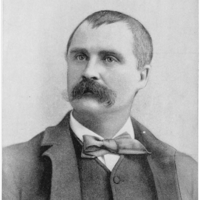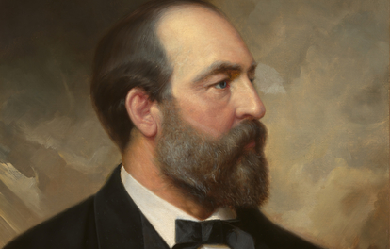Haunted by Tigers
NATHAN BEANS and William Lambert were two wild New England boys,
Known from infancy to revel only in forbidden joys.
Many a mother of Nantucket bristled when she heard them come,
With a horrid skulking whistle, tempting her good lad from home.
But for all maternal bristling little did they seem to care,
And they loved each other dearly, did this good-for-nothing pair.
So they lived till eighteen summers found them in the same repute,—
They had well-developed muscles, and loose characters to boot.
Then they did what wild Nantucket boys have never failed to do,—
Went and filled two oily bunks among a whaler’s oily crew.
And the mothers,—ah! they raised their hands and blessed the lucky day,
While Nantucket waved its handkerchief to see them sail away.
On a four years’ cruise they started in the brave old ‘Patience Parr,’
And were soon initiated in the mysteries of tar.
There they found the truth that whalers’ tales are unsubstantial wiles,—
They were sick and sore and sorry ere they passed the Western Isles;
And their captain, old-man Sculpin, gave their fancies little scope,
For he argued with a marlinspike and reasoned with a rope.
But they stuck together bravely, they were Ishmaels with the crew:
Nathan’s voice was never raised but Bill’s support was uttered too;
And whenever Beans was floored by Sculpin’s cruel marlinspike,
Down beside him went poor Lambert, for his hand was clenched to strike.
So they passed two years in cruising, till one breathless burning day
The old 'Patience Parr’ in Sunda Straits with flapping canvas lay.
On her starboard side Sumatra’s woods were dark beneath the glare,
And on her port stretched Java, slumbering in the yellow air,—
Slumbering as the jaguar slumbers, as the tropic ocean sleeps,
Smooth and smiling on its surface with a devil in its deeps.
So swooned Java’s moveless forest, but the jungle round its root
Knew the rustling anaconda and the tiger’s padded foot.
There in Nature’s rankest garden, Nature’s worst alone is rife,
And a glorious land is wild-beast ruled for want of human life.
Scarce a harmless thing moved on it, not a living soul was near
From the frowning rocks of Java Head right northward to Anjier.
Crestless swells, like wind-raised canvas, made the whaler rise and dip,
Else she lay upon the water like a paralytic ship;
And beneath a topsail awning lay the lazy, languid crew,
Drinking in the precious coolness of the shadow,—all save two:
Two poor Ishmaels,—they were absent, Heaven help them!—roughly tied
‘Neath the blistering cruel sun-glare in the fore-chains, side by side.
Side by side as it was always, each one with a word of cheer
For the other, and for his sake bravely choking back the tear.
Side by side, their pain or pastime never yet seemed good for one;
But whenever pain came, each in secret wished the other gone.
You who stop at home and saunter o’er your flower scattered path,
With life’s corners velvet cushioned, have you seen a tyrant’s wrath?—
Wrath, the rude and reckless demon, not the drawing-room display
Of an anger led by social lightning-rods upon its way.
Ah! my friends, wrath’s raw materials on the land may sometimes be,
But the manufactured article is only found at sea.
And the wrath of old-man Sculpin was of texture Number One:
Never absent,—when the man smiled it was hidden, but not gone.
Old church-members of Nantucket knew him for a shining lamp,
But his chronic Christian spirit was of pharisaic stamp.
When ashore, he prayed aloud of how he’d sinned and been forgiven,—
How his evil ways had brought him 'thin an ace of losing heaven;
Thank the Lord! his eyes were opened, and so on; but when the ship
Was just ready for a voyage, you could see old Sculpin’s lip
Have a sort of nervous tremble, like a carter’s long-leashed whip
Ere it cracks; and so the skipper’s lip was trembling for an oath
At the watch on deck for idleness, the watch below for sloth,
For the leash of his anathemas was long enough for both.
Well, ' twas burning noon off Java: Beans and Lambert in the chains
Sank their heads, and all was silent but the voices of their pains.
Night came ere their bonds were loosened; then the boys sank down and slept,
And the dew in place of loved ones on their wounded bodies wept.
All was still within the whaler,—on the sea no fanning breeze,
And the moon alone was moving over Java’s gloomy trees.
Midnight came,—one sleeper’s waking glance went out the moon to meet:
Nathan rose, and turned from Lambert, who still slumbered at his feet.
Out toward Java went his vision, as if something in the air
Came with promises of kindness and of peace to be found there.
Then toward the davits moved he, where the lightest whaleboat hung;
And he worked with silent caution till upon the sea she swung,
When he paused, and looked at Lambert, and the spirit in him cried
Not to leave him, but to venture, as since childhood, side by side;
And the spirit’s cry was answered, for he touched the sleeper’s lip,
Who awoke and heard of Nathan’s plan to leave th’ accursed ship.
When ’twas told, they rose in silence, and looked outward to the land,
they only saw Nantucket, with its homely, boat-lined strand;
But they saw it—oh! so plainly—through the glass of coming doom.
Then they crept into the whale-boat, and pulled toward the forest’s gloom,—
All their suffering clear that moment, like the moonlight on their wake,
Now contracting, now expanding, like a phosphorescent snake.
Hours speed on: the dark horizon yet shows scarce a streak of gray
When old Sculpin comes on deck to walk his restlessness away.
All the scene is still and solemn, and mayhap the man’s cold heart
Feels its teaching, for the wild-beast cries from shoreward make him start
As if they had warning in them, and he o’er its meaning pored,
Till at length one shriek from Java splits the darkness like a sword;
And he almost screams in answer, such the nearness of the cry,
As he clutches at the rigging with a horror in his eye,
And with faltering accents mutters, as against the mast he leans,
‘Darn the tigers! that one shouted with the voice of Nathan Beans!’
When the boys were missed soon after, Sculpin never breathed a word
Of his terror in the morning at the fearful sound he’d heard;
But he entered in the log-book, and ’twas witnessed by the mates,
Just their names, and following after, ‘Ran away in Sunda Straits.’
Two years after, Captain Sculpin saw again the Yankee shore,
With the comfortable feeling that he’d go to sea no more.
And ’twas strange the way he altered when he saw Nantucket light:
Holy lines spread o’er his face, and chased the old ones out of sight.
And for many a year thereafter did his zeal spread far and wide,
And with all his pious doings was the township edified;
For he led the sacred singing in an unctuous, nasal tone,
And he looked as if the sermon and the scriptures were his own.
But one day the white-haired preacher spoke of how God’s justice fell
Soon or late with awful sureness on the man whose heart could tell
Of a wrong done to the widow or the orphan, and he said
That such wrongs were ever living, though the injured ones were dead.
And old Sculpin’s heart was writhing, though his heavy eyes were closed,—
For, despite his solemn sanctity, at sermon times he dozed;
But his half-awakened senses heard the preacher speak of death
And of wrongs done unto orphans, and he dreamed with wheezing breath
That cold hands were tearing from his heart its pharisaic screens,
That the preacher was a tiger with the voice of Nathan Beans!
And he shrieked and jumped up wildly, and upon the seat stood he,
As if standing on the whaler looking outward on the sea;
And he clutched as at the rigging with a horror in his eye,
For he saw the woods of Java and he heard that human cry,
As he crouched and cowered earthward. And the simple folk around
Stood with looks of kindly sympathy: they raised him from the ground,
And they brought him half unconscious to the humble chapel door,
Whence he fled as from a scourging, and he entered it no more;
For the sight of that old preacher brought the horror to his face,
And he dare not meet his neighbors’ honest eyes within the place,
For his conscience like a mirror rose and showed the dismal scenes,
Where the tiger yelled forever with the voice of Nathan Beans.


